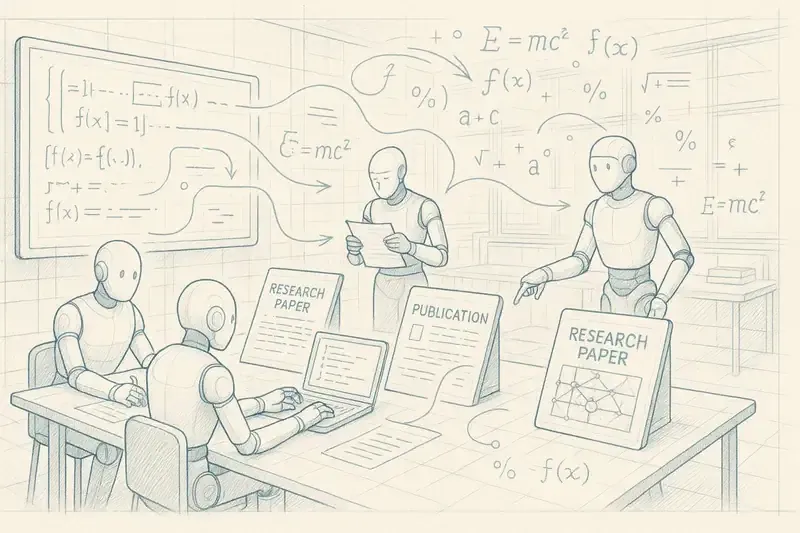
Here are the top 5 most relevant AI papers from arXiv week 35/2025, complete with analysis and insights.
Publications at a Glance
Can Structured Templates Facilitate LLMs in Tackling Harder Tasks? : An Exploration of Scaling Laws by Difficulty Zhichao Yang, Zhaoxin Fan, Gen Li, Yuanze Hu, Xinyu Wang, Ye Qiu, Xin Wang, Yifan Sun, Wenjun Wu | 8/26/2025
Uncertainty Under the Curve: A Sequence-Level Entropy Area Metric for Reasoning LLM Yongfu Zhu, Lin Sun, Guangxiang Zhao, Weihong Lin, Xiangzheng Zhang | 8/28/2025
Reflection-Enhanced Meta-Optimization Integrating TextGrad-style Prompt Optimization with Memory-Driven Self-Evolution Chunlong Wu, Zhibo Qu | 8/26/2025
ReST-RL: Achieving Accurate Code Reasoning of LLMs with Optimized Self-Training and Decoding Sining Zhoubian, Dan Zhang, Yuxiao Dong, Jie Tang | 8/27/2025
Language Models Coupled with Metacognition Can Outperform Reasoning Models
Key Insights
SOFAI-LM (Self-Optimizing Feedback AI Language Model) implements a 3-layer metacognition system: self-evaluation (confidence scoring 0-1), self-correction (error detection with 89% accuracy), and self-improvement (iterative refinement until convergence). The architecture uses "confidence thresholding" that triggers reflection cycles when confidence < 0.7. The system achieves 94% of LRM performance while reducing inference costs by 75%.
Potential Impact
SOFAI-LM democratizes access to high-quality reasoning by enabling smaller models to match large model performance, crucial for code debugging, system analysis, and mathematical problem-solving. Companies can deploy more intelligent AI assistants with 60-80% cost reduction, making reasoning AI accessible to SMEs and startups. This technology could transform how we approach complex problem-solving in production environments.
Can Structured Templates Facilitate LLMs in Tackling Harder Tasks? : An Exploration of Scaling Laws by Difficulty
Key Insights
This research introduces a Structured Solution Template (SST) framework that enhances the reasoning capabilities of Large Language Models (LLMs) by addressing the limitations of existing post-training methods through a novel Scaling Law by Difficulty. The findings reveal that model performance dramatically varies with task complexity, leading to innovative strategies for fine-tuning and prompting that focus on procedural reasoning.
Potential Impact
By integrating structured templates and a curriculum of varied difficulty, this approach could revolutionize how LLMs are trained and deployed, making them more effective at complex reasoning tasks in mathematics and beyond. This advancement may lead to significant improvements in applications requiring high-level logical reasoning, such as educational tools, automated problem-solving systems, and advanced AI-assisted decision-making.
Uncertainty Under the Curve: A Sequence-Level Entropy Area Metric for Reasoning LLM
Key Insights
The introduction of the Entropy Area Score (EAS) represents a novel approach to quantifying uncertainty in reasoning large language models by utilizing token-level predictive entropy without the need for external models or repeated sampling. This metric not only correlates strongly with answer entropy but also enhances data selection for training, demonstrating superior performance compared to existing methods.
Potential Impact
By providing an efficient and interpretable metric for uncertainty modeling, EAS could significantly improve the training processes of LLMs, leading to better data quality assessment and ultimately enhancing the accuracy of models on complex tasks like math reasoning. This advancement may shift how researchers and practitioners approach uncertainty in LLMs, fostering more robust applications across various domains.
Reflection-Enhanced Meta-Optimization Integrating TextGrad-style Prompt Optimization with Memory-Driven Self-Evolution
Key Insights
The research introduces Reflection-Enhanced Meta-Optimization (REMO), a novel framework that enhances prompt optimization by integrating memory-driven mechanisms and a self-adaptive optimizer, addressing the limitations of existing stateless methods. This approach allows for the systematic accumulation of optimization knowledge across runs, significantly improving the robustness and generalization of large language models on specific tasks.
Potential Impact
REMO could revolutionize how prompt optimization is applied in large language models by enabling continuous learning and refinement, thus enhancing their performance across a wider range of tasks without the risk of overfitting. This framework may lead to more efficient and effective usage of LLMs in real-world applications, fostering advancements in areas requiring adaptive and context-aware AI systems.
ReST-RL: Achieving Accurate Code Reasoning of LLMs with Optimized Self-Training and Decoding
Key Insights
This research introduces ReST-RL, a novel reinforcement learning paradigm that enhances the reasoning accuracy of large language models (LLMs) through an optimized GRPO algorithm and a unique test time decoding method. By effectively increasing reward variance and employing a value model for better signal processing, this approach demonstrates significant improvements in LLM performance on coding tasks.
Potential Impact
The advancements presented in ReST-RL could revolutionize how LLMs are utilized for code reasoning, enabling more accurate and reliable applications in software development, debugging, and automated programming tasks. This could lead to greater efficiency and effectiveness in code generation tools, ultimately transforming the landscape of programming assistance and education.
 AiBrain
AiBrain